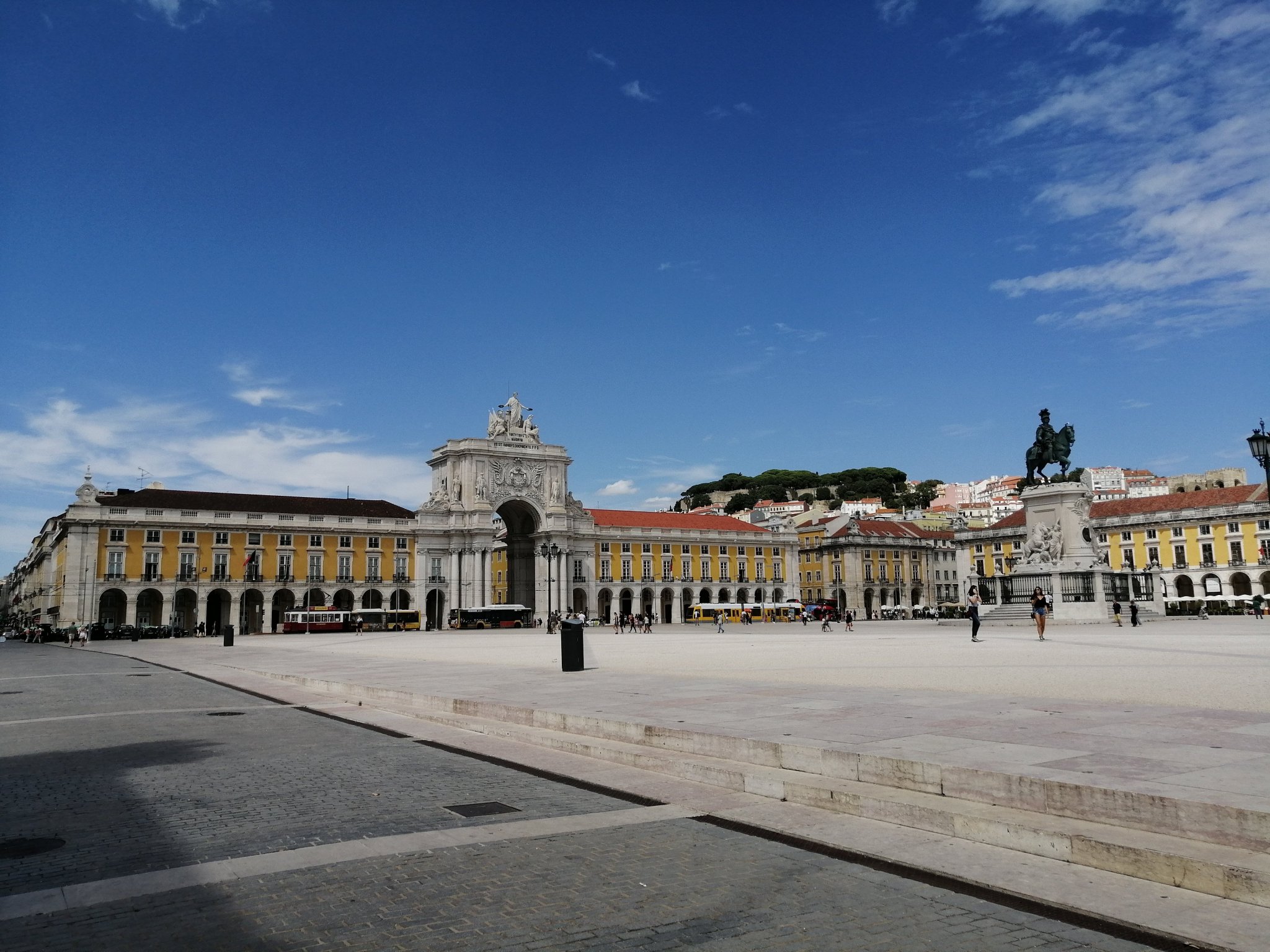For six months, Portugal takes over the presidency of the Council of the European Union in the newest iteration of the Trio with Germany and Slovenia stating an ambitious agenda during the Corona pandemic. What can the other 26 states expect from one of its most underestimated EU members?
A Comment by Sylvia Wittmer, Erika Effenberkova and Txai de Almeida
“Ficar em casa” whilst dealing with the fate of the Union
The headquarters of Portugal’s presidency is in the Centro Cultural de Belém, one of the places which you can reach by the iconic yellow trams in Lisbon. A visit to the cultural centre usually suggests a short walk alongside the Tagus river. But at this moment no one expects a huge number of visitors. Just like the rest of the European Union, Portugal enters the new year with its EU Council takeover facing a global health crisis.
So on 1st of January, the first day of the Portuguese presidency, people in Lisbon and high-risk municipalities were rushing to their homes closely before 13:00. The Portuguese state declared a state of emergency and one of its measures is #ficaemcasa (a stay-at-home order). This term expresses not only a reality of most Portuguese households but also describes the new reality of EU politics. With an unprecedented impact on its citizens, jobs, and the Eurozone.
The coming months thus represent a challenge for any member state at the helm of the EU. One wonders how Portugal will fare in this particular political climate. While its capital was the namesake for further European integration in 2007, the Lisbon Treaty, Portugal often remains an unknown player in EU politics. Since joining the EU, Portugal too often gets lumped together with bigger countries in a different array of acronyms and classifications, such as PIGS and GIPSI, emphasising the economic struggles during the Great Recession. These classifications omit the significant social and democratic developments since 1974. We believe that the strength of the trio presidency will in large part stem from Portugal’s unique cultural and political identity complementing Germany’s previous efforts.
The great unknown: Portuguese cultural and political identity beyond the acronyms
When reference is made to Portugal in the context of the EU, much emphasis is placed on comparison with its neighbour Spain as well as other EU countries that have shared some of the same struggles in recent decades. Yet Portugal does have its own political identity beyond sibling rivalry and diplomatic tradition which differentiates it from other Southern European states.
The Portuguese empire has played an enormous role in shaping European and global history. Its commercial network expanded over every continent and played a leading role in the Atlantic Slave Trade, a problematic heritage that is subject to renewed domestic debate. After centuries of Portuguese hegemonic power during the Age of Discovery (15th-17th century), the country remained relatively isolated from European affairs up until the 1970s. The reason for its exclusion from the early stages of European integration was that Portugal was ruled by an authoritarian regime.
The Estado Novo was toppled during the Carnation Revolution, which began as a military coup on 25 April 1974 and soon after transformed into a movement of widespread civil resistance. The democratic revolution not only ended 48 years of dictatorship, it also initiated Portugal´s integration into the European community. In 1977, Mário Soares, the Prime Minister of the first constitutional government under the new constitution, submitted Portugal’s application to join the EU. Nine years later, Portugal formally became a member.
In the years shortly following Portugal’s integration, the country underwent a much needed socioeconomic transformation. It entered the EU as one of the poorest countries in Europe with a GDP per capita of 3,862 Dollar and growth rates well below the European average. By 1992, Portugal took advantage of having gained access to the EC market, and increased its GDP per capita to 10,811 Dollar, while achieving economic growth rates above the EU average. In the 1990s, Portugal successfully cut its fiscal deficit, implemented further structural reforms, and ultimately met the Maastricht criteria to become part of the first 11 member states to adopt the Euro in 1999.
Portugal’s rapid development not only occured on an economic level but also on a political level. Who would have thought that after decades of being at the margins of the continent, Portugal would play a key role in shaping EU politics over the past decades? The last Portuguese presidencies were marked by the adoption of the Lisbon Strategy in 2000 under the presidency of now UN Secretary-General António Guterres and the signing of the Treaty of Lisbon in 2007 as its respective major milestones.
Unfortunately Portugal’s status as the EU’s poster child began to crumble in the early 2000s. Since then, the country’s GDP per capita fell from over 80 percent of the EU average to just over 70 percent in 2007 and youth unemployment began to soar – a decline that led The Economist to describe Portugal as the “new sick man of Europe”. Its already troubling economic situation became even worse with the advent of the Great Recession that put the country on the verge of bankruptcy in 2011. Even though the decision to implement fiscal austerity did not lead to widespread anti-EU sentiment (like we saw in Spain, Italy or Greece), it did plunge the country into a major political crisis and never recovered from.
Responding to the crisis at hand while moving forward
Last December, EP President David Sassoli and Portugal’s Prime Minister António Costa held a press conference to present the main priorities for the six months of Portugal’s EU Council presidency: economic recovery, social protection and strategic autonomy.
The European Commission and the Council came to a political agreement on the Recovery and Resiliency Facility (RRF). The RRF is the EU’s plan to support reforms and investments creating a driving force of post-pandemic recovery. Over one third (37 percent) of the budget is to be spent on the green transition. It suggests that Portugal could frame the pandemic and climate change as two interconnected issues and establish deeper cooperation at Europe’s external borders.
The second priority entails both the response to the Covid-19 pandemic as well as the emphasis on digital and green transitioning including measures for businesses (SMEs) with regard to their competitiveness. The need to strengthen social protection so no one is left behind also includes a common vision on health issues to get through the pandemic, including a joint purchasing of the vaccine. For the pursuit of this goal, Portugal invited EU Heads of State or Government, EU institutions, social partners and other key stakeholders to a Social Summit in Porto on 7 May 2021. At this summit the EU will have to find practical implementations of their previously proclaimed European Pillar of Social Rights, emphasising the European social model.
Managing expectations while focusing on domestic issues
The first days of the Portuguese presidency were marked by its first domestic scandal. The Ministry of Justice overstated the qualifications of its candidate for a prosecutor seat at the European Public Prosecutor’s Office (EPPO). This incident became one of the main topics of political debates and reveals partially one of the potential fragilities, since it strained domestic support for one of the first political choices made during the presidency.
While the teamplayer narrative is strong, Portugal’s prime minister António Costa has declared that with the triple crisis (health-wise, financially and socially) linked to the Covid-19 pandemic, foreign minister Augusto Santos Silva will take the lead during the EU Council presidency in order for him to focus on internal issues. This is in line with Portugal’s traditional stance on the presidency as a primarily diplomatic task.
Santos Silva will be the driving force in pursuing the completion of several dossiers initiated by Germany as their trio partner. Given that the nature of the presidency has shifted and that the “room for creativity” is limited by the creation of the position of the President of the European Council and the High Representative of the Union for Foreign Affairs and Security Policy, observers are skeptical about making a significant impact. Portuguese political analyst Alice Cunha points out that this presidency is not only marked by the challenges of Covid-19, but also marks the first presidency after the departure of the UK from the EU and during the transition of a new US administration. The Biden administration bears the promise of a return to a more traditional understanding of transatlantic relations. With its presented agenda, Portugal at the helm, however, requires an adjustment focusing on issues such as online platforms and technology, trade, health responses, security and climate change.
With Portuguese history comes a strong bond not only with the U.S. as a transatlantic partner. A broader understanding of transatlantic ties also include Latin America with regards to the EU-MERCOSUR agreement or with Europe’s cooperation with Latin America and the Carribean. Acting upon its (problematic yet barely reflected) history with Africa and India, Portugal is aiming furthermore to hold an EU-India summit during its presidency and boost EU-African relations as with its prior presidencies. In previous presidencies Portugal put a strong emphasis on the EU’s external relations, having vowed to build new bonds with countries in the Indo-Pacific region including Australia and New Zealand.
Can Portugal do it all?
In its fourth presidency since joining the EU, Portugal has set out an ambitious agenda and needs to build on its strengths in order to achieve progress in the next six months. These strengths lie in particular in its diplomatic capacites, due to its unique transatlantic approach focusing not only on the northern hemisphere but also on Latin and South America, which are often forgotten in a more Central European dominated debate. With its linguistic and historical trade-based global ties, Portugal has the opportunity to use its uniqueness to benefit the EU, although it must work towards ensuring more sustainability in these diplomatic ties for the EU as a whole.
Playing with the tendency to be underestimated, Portugal has the opportunity to push for progress in several dossiers of the trio presidency in a more forceful manner than Germany’s perception, as a potentially too dominant actor causing resistance, allowed it to. The Costa administration needs to be careful not to be swept away by momentary needs and to lose focus with regard to their long-term strategic aims for the EU. While the response to the pandemic will naturally bind capacities within all member states, it is important for Portugal to reach out and strengthen its ties with EU countries other than Spain and traditional partners in the EU. Despite possible obstacles, what begins as “saudade” (a Portuguese word expressing a deep sad emotional state of longing for a person or thing that is absent) of European citizens staying at home, the Portuguese leadership has a unique potential to bring a sign of relief for Europe and it has six months to fulfil high expectations put on its weight.
During Germany’s 2020 EU Council presidency, we will publish several articles in English and German analysing some of the German priorities in the EU, e.g. agriculture, climate change, how to deal with threats to free speech, recovery plan for Europe, Brexit, digitisation, multilateralism and rule of law. Until the end of the year, when Portugal will take over the presidency for 6 months.
This project is supported by the German Foreign Office.
- Zeigt die Berliner Libyen-Konferenz echte Resultate?
- Die europäische Automobilindustrie zwischen Rezession und Modernisierung
- Жыве Беларусь! Belarus’ einzigartige Protestbewegung entzieht sich jeglicher Labels
- Georgia’s youth is taking European association to another level
- May a hard Brexit clear the air after all?
- Reine (Re)Form-Sache? Die Nachhaltigkeit der GAP in der Kritik
- Eine Aufsicht gegen die “Schlupflöcher” des Binnenmarkts? Wie Europa gegen Geldwäsche vorgehen will
- Die Integration Europas wird im Kultursektor entschieden
- Reproductive health beyond the protests: Quo vadis, Europe?
- Democracy and human rights undermined: The second Nagorno-Karabakh war
- Rechtsstaatlichkeit in Europa: Wo kommen wir her, wo wollen wir hin?
The Polis Blog serves as a platform at the disposal of Polis180’s & OpenTTN’s members. Published comments express solely the authors’ opinions and shall not be confounded with the opinions of the editors or of Polis180.
Image via Sylvia Wittmer (“Praça do Comércio”)
Kernaussagen
Portugals 4. EU-Ratspräsidentschaft: Navigieren durch unvorhergesehene Zeiten
Deutschland hat zum 1.1.2021 die Ratspräsidentschaft an Portugal übergeben, als zweiter der Trio-Ratspräsidentschaft mit Slowenien und einer ambitionierten Agenda in Zeiten der Covid-19-Pandemie. Was können die anderen 26 EU-Mitgliedstaaten von einem seiner unterschätztsten Mitglieder erwarten?
Das Hauptquartier der aktuellen Ratspräsidentschaft ist im Centro Cultural de Belém, ein Ort den man mit den traditionellen gelben Straßenbahnen in Lissabon erreichen kann. Doch auch wie der Platz Praça do Comércio (Titelbild) werden momentan kaum Touristen erwartet. Ungewöhnliche Zeiten für Portugals beliebte Hauptstadt. Am 1. Januar wurde dann auch gleich ein neuer Lockdown #ficaemcasa verkündet, eine neue Realität für die Menschen, ihre Arbeit und die Eurozone. Als Namensgeber für einen der wichtigsten EU-Verträge, dem Vertrag von Lissabon (2007), wird Portugals Regierungssitz zwar immer noch als eher kleiner Mitspieler auf EU-Ebene verstanden, doch wir glauben, dass die kulturelle und politische Entwicklung des Landes der Ratspräsidentschaft eine besondere eigene Note geben kann.
Oft wird es mit seinem großen Nachbarn Spanien verglichen, dabei erzählt die Geschichte der Seefahrernation von langen Traditionen, von Expeditionen und transatlantischem Sklavenhandel bis hin zur Nelkenrevolution 1974, dem Ende des Estado Novo Regimes und der offiziellen EU-Mitgliedschaft 1986 als eines der ärmsten europäischen Länder. Nach einigen strukturellen Reformen konnte Portugal schließlich 1999 der Eurozone beitreten. Doch trotz erfolgreicher EU-Ratspräsidentschaften, sackte die portugiesische Wirtschaft in den Nullerjahren erneut ein, wovon sich das Land immer noch nicht erholt hat, von den Herausforderungen in Corona-Zeiten ganz zu schweigen.
Europas Aufbauplan, EU-Sozialpolitik und strategische Autonomie stehen u.a. auf der Agenda bis Slowenien die Ratspräsidentschaft im Juli diesen Jahres mit eigenen Prioritäten übernimmt. Ein wichtiger Termin wird insbesondere der geplante Sozialgipfel in Porto im Mai sein mit dem Ziel, die soziale Komponente Europas zu stärken, um den Herausforderungen der Chancengleichheit auf dem Arbeitsmarkt und des Klimawandels im digitalen Zeitalter gerecht zu werden. Um sich auf die Erholung des eigenen Landes zu fokussieren, hat Premier António Costa erklärt, dass der portugiesische Außenminister Augusto Santos Silva viele Aufgaben der Ratspräsidentschaft übernehmen wird.
Bei den Themen transatlantische Partnerschaft, dem Handelsabkommen EU-MERCOSUR oder bezüglich der vertieften Zusammenarbeit mit Lateinamerika und der Karibik kann Portugal in Verhandlungen von seiner jahrhundertealten Beziehung zum gesamten amerikanischen Kontinent profitieren. Doch wünschen wir uns von der portugiesischen Ratspräsidentschaft mehr Engagement in der EU-Migrations- und Integrationspolitik. Die deutsche Ratspräsidentschaft hat in Sachen Gemeinsamer Agrarpolitik oder Rechtsstaatlichkeit gut vorgelegt. Doch bleiben anhaltende Krisen in Europas Nachbarschaft wie in Bergkarabach große außenpolitische Herausforderungen für die EU – die Portugal nicht allein lösen, aber innerhalb der nächsten sechs Monate vorantreiben und auf globaler Ebene, auf EU-Ebene und zu Hause die öffentliche Debatte um jene dringenden Themen beeinflussen kann.
Mensagens principais
A quarta presidência portuguesa do Concelho da União Europeia: uma navegação em tempos sem precedentes
Na penúltima contribuição da série sobre a presidência alemã do grassroots think tank Polis180, temos um comentário de três membros com relações a Portugal. A Erika, o Txai e a Sylvia fazem uma introdução pessoal ao público alemão e internacional quanto aos aspetos da cultura política de Portugal menos conhecidos, que na sua opinião influenciarão a quarta presidência portuguesa do Conselho da União Europeia.
A contribuição visa mostrar ao público alemão que além dos dados e factos apresentados pelo governo português de forma oficial, Portugal tem muito mais a oferecer durante a sua presidência. Ao mesmo tempo, os autores expressam esperanças e desejos para a segunda presidência em que Portugal se segue à Alemanha. Os autores consideram que a perceção de Portugal como team player diplomático na UE e para além dela pode ser utilizada a favor da União e do país, mostrando que a influência de Portugal vai muito além da perceção de que se trata somente de um destino turístico.
Além das amizades diplomáticas com o Reino Unido e os Estados Unidos, que têm a sua fundação nas relações comercias tradicionais, esperamos que Portugal utilize os seus laços políticos únicos com regiões importantes, mas pouco endereçadas por outros membros, como o continente africano, a América do Sul, as Caraíbas e a Índia a favor da União Europeia. Desejamos que Portugal não só reative esses laços durante a sua presidência, mas também consiga introduzir esses parceiros de uma forma mais sustentável e permanente a favor da autonomia estratégica da União.
A habilidade diplomática de Portugal e a sua perceção diferente da Alemanha promete a finalização de vários dossiers que a parceira Alemanha não foi capaz de atingir, seja por causa da pandemia Covid-19, seja por tensões bilaterais ou multilaterais na UE de quais Portugal não foi sujeito. A cimeira social no Porto na primavera, se for bem-sucedida em produzir medidas práticas, será um grande passo em frente na agenda social que Portugal marcou como um dos seus três focos.
O público alemão interessado vai observar de forma atenta a presidência portuguesa, coordenada pelo ministro dos negócios estrangeiros e com uma agenda ambicionada especialmente à área social e diplomática, será diferente da aproximação do próprio governo que trouxe a última presidência liderada por Angela Merkel. Como um grassroots think tank jovem, acreditamos que há várias áreas nas quais a presidência pode melhorar o trabalho feito até hoje. A política com respeito à migração e integração e a crise na vizinhança ao leste da União em Nagorno-Karabakh são somente dois exemplos nos quais os nossos membros vêm potencial de melhoria. É claro que Portugal não vai conseguir resolver estas crises em apenas seis meses, mas cremos que será possível navegar a União na direção da paz e melhorar a colaboração com todos os membros da União, não só os parceiros tradicionais. A dificuldade será manter a União unida e focada nas escolhas estratégicas dos próximos meses, além da capacidade de resposta somente aos problemas do dia a dia e imprevistos de última hora.
A cooperação com a terceira parceira, a Eslovénia, pode ser a vantagem crucial no melhoramento das relações com os membros da UE no leste e sudeste da Alemanha. Com uma União unida acreditamos que Portugal será capaz de dirigir a União até ao fim da pandemia e atingir, ou pelo menos aproximar, os objetivos ambicionados e referidos na primeira conferência de imprensa no início do mês. Está na hora do resto da União se aperceber que este país do Oeste não deve ser subestimado.

Sylvia is a PhD candidate at Humboldt Universität zu Berlin where she researches legal questions arising in post-conflict situations from an international and jewish law perspective. As a founding member of Polis180 she currently heads the programme Religion and Foreign Policy. Sylvia is a dual citizen of Portugal and Germany.

Erika studied at the Prague University of Economics and Business and at Charles University. Currently she works in the field of social networks and political communication in Lisbon. She engaged in the Climate & Energy programme at Polis180 and in supporting children rights in Berlin.

Txai studied Political Science and Philosophy in London. His research has focused on the intersection between ethics and public policy. At Polis180 he has been active within the European Identity programme. He is a dual citizen of Brazil and Germany.
